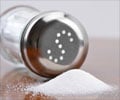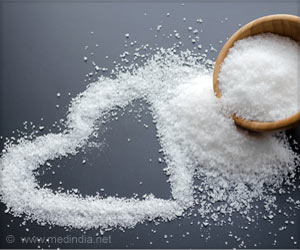Consuming iodized salt regularly could do more harm than good. Excess intake of iodine can cause several forms of rhythm disturbances in heart, and lead to heart failure.

‘People consuming iodized salt are at a higher risk of suffering from high blood pressure than those who are using pebble salt. Excess intake of iodine can cause several forms of rhythm disturbances in heart, and lead to precipitating angina and heart failure.’
Read More..




The book is based on a recent study on nearly 100 elderly patients in Agra, UP. Read More..
The study included patients who were consuming iodized salt regularly and was compared with another group who were not using iodized salt but pebble salt, which is also iodised, but the iodine content gets washed off, thereby minimizing or avoiding iodine in the salt.
"The results indicated the people consuming iodized salt were more at risk of suffering high blood pressure than the ones who were using pebble salt, washed before use," Chauhan told IANS.
Excess consumption of iodine can also cause various forms of rhythm disturbances in heart, and lead to precipitating angina and heart failure.
To control iodine deficiency disorders around the world, the World Health Organisation (WHO) in a statement in August 1994 stressed universal salt iodization as the principal public health measure for eliminating Iodine Deficient Disorders.
Advertisement
While iodine deficiency in children can raise a condition called cretinism, usually characterized with laziness, crying, pot belly, and low intellect; excess iodine intake as a result of universal salt iodization could be causing attention deficit hyperactivity disorder in children, the findings showed.
Advertisement
"In my book, and from the references that I have used therein taken from the domain of the British Medical Journal, we have raised the possibility of a global rise in the incidence and prevalence of hypertension, possibly due to regular consumption of iodized salt," he noted.
He stressed the need for more research, which must include the overarching necessity of continuing with enforcing consumption of iodized salt even in regions that are not deficient in iodine.
Immediate corrective steps are needed at national and global levels, and supplemental iodine is to be used only in areas that are deficient in iodine.
More importantly, non-iodised salt must also be made available in the market, which has been missing from the shelves for the past two decades and more, Chauhan suggested.
Source-IANS









